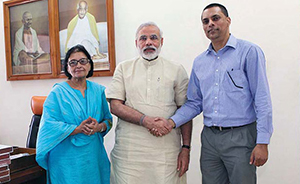Minister Address Diaspora
Minister of Works and Infrastructure, Dr Surujrattan Rambachan has called for, "tough negotiations with the authorities responsible for resource distribution and policy formulation".
He was delivering the feature address at the opening of the National Council of Indian Culture (NCIC) 50th anniversary celebrations at Divali Nagar on Friday night said that the, "attitude we have had of silently complaining about lip service to the support of our culture must be replaced with tough negotiations with the authorities responsible for resource distribution and policy negotiations."
"We must become fully participating stakeholders and not appendages, or be invited to contribute after decisions have been made in matters of policy discussions on culture. We must help shape the future and not be shaped by what others think are best for all of us. We must ensure that the destiny of the Caribbean is also shaped by our presence and by our way of life, which has many facets for inspiring economic growth, a value driven society, excellence and prosperity," he said.
"The role of Divali Nagar is vastly underestimated in ensuring the preservation and further development of our cultural traditions in a diverse nation. Every year, the culture moves forward into new realms of expression as performers strive for creativity, innovation and excellence on the big stage. The Nagar is both a journey and a destination, but it is also a fortress where the culture is shown with pride and love. The Nagar is an every year restatement of identity and identification," Dr Rambachan said.
He said that no nation can survive without the nurturing of the spiritual and intellectual parts of our being. The NCIC has, over the past five decades, regularly invited distinguished philosophers from this nation and abroad, who have addressed appreciative audiences on many aspects of Indian culture, providing great enlightenment.
"Our prosperity today is a gift of our ancestors who dreamed of new possibilities for us and practiced self-control to make this a reality. Community cooperation crossed religious and other boundaries and had a spontaneous quality that is rarely seen today," he said.
President of the NCIC, Dr Deokienanan Sharma pointed out that the NCIC has been in the forefront of preserving our cultural heritage in Trinidad and Tobago and, has also helped within its limited resources in the revival and preservation of East Indian culture in many of the Caribbean islands where for various reasons the culture had been virtually lost.
"Much more needs to be done. The interest in the revival is there and a concerted effort is needed far beyond what the NCIC can manage. I hope that the conference will come up with durable solutions to assist our less fortunate Caribbean brothers," Dr Sharma said.
Dr. Primnath Gooptar, conference coordinator, said that in considering the future of Indian culture in the Caribbean, while the organization is mindful of the fact that culture is a dynamic thing, never static, ever-changing, it remains committed to preserving and transmitting traditional aspects of our culture from one generation to the next. "Cultural change is, therefore, one of the major concerns that will be addressed during the conference"
Joe Ramkissoon, chairman, Organizing Committee, said that this International Diaspora Conference will provide, "a snapshot of Indian Culture as it exists worldwide, and give us the incentive to preserve historical artifacts, cultural relics, recordings and cultural presentations to the international Indian Diaspora."
Delegates have come from USA, Mauritius, India, Netherlands, Canada, and Jamaica.











Comments.